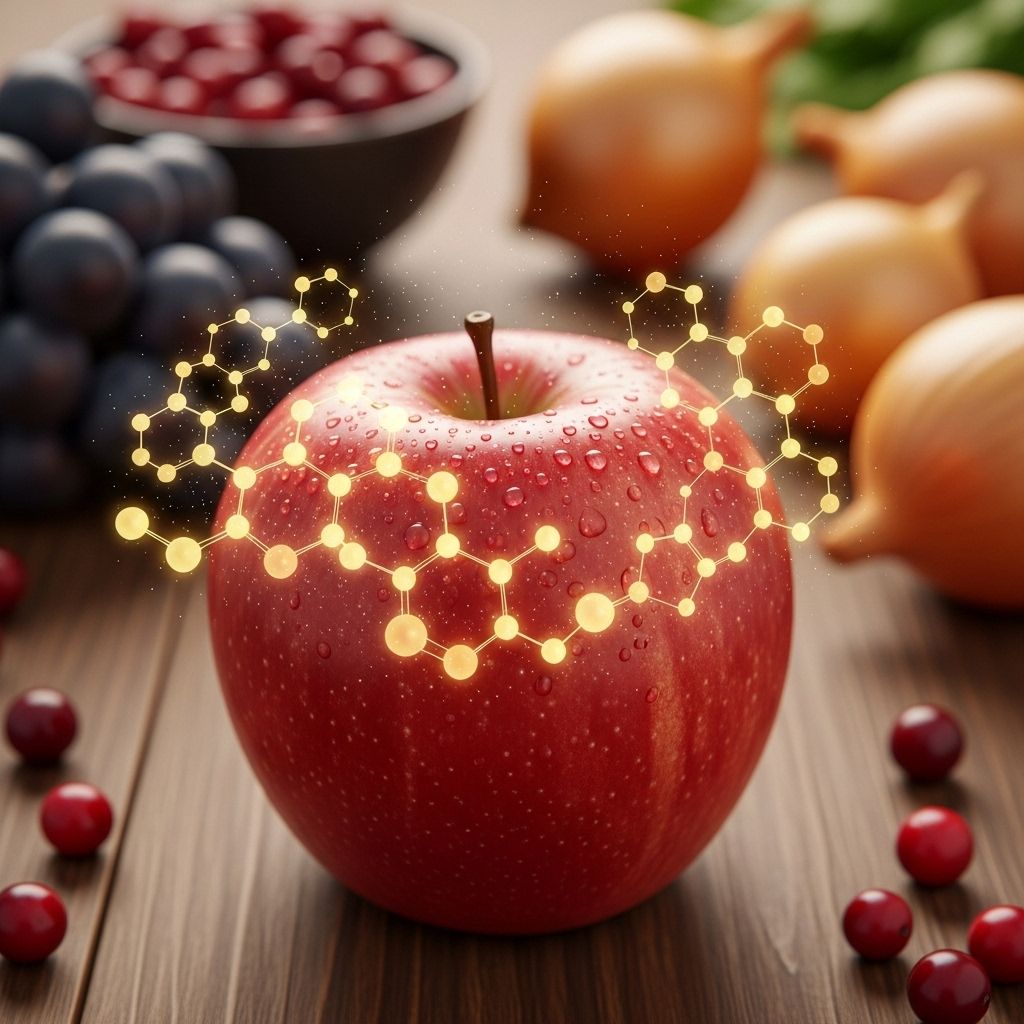Unlocking the Health Benefits of Quercetin
Discover the multifaceted advantages of quercetin in enhancing overall well-being.

Introduction to Quercetin
Quercetin, a flavonoid found in numerous fruits and vegetables, has been a staple in human diets for centuries. Its extensive health benefits, ranging from antioxidant and anti-inflammatory properties to potential anticancer effects, have been extensively studied. This article delves into the comprehensive advantages of quercetin, exploring its impact on various health conditions and its potential as a preventive measure against chronic diseases.
Health Benefits of Quercetin
Antioxidant PropertiesQuercetin is renowned for its strong antioxidant properties, which enable it to scavenge free radicals and reduce oxidative stress. This capability plays a crucial role in protecting cellular structures from damage, thereby supporting overall health and well-being. Anti-Inflammatory EffectsQuercetin’s anti-inflammatory properties involve inhibiting the production of inflammatory cytokines and enzymes. This action makes it a potential therapeutic agent for managing various inflammatory conditions, including chronic diseases like rheumatoid arthritis and cardiovascular diseases. Cardiovascular Health BenefitsQuercetin has been shown to lower blood pressure, reduce cholesterol levels, and improve endothelial function, making it a promising candidate for preventing and treating cardiovascular diseases. It enhances nitric oxide bioavailability and inhibits the angiotensin-converting enzyme (ACE), contributing to vasodilation and reduced vascular resistance. Anticancer PropertiesResearch indicates that quercetin exhibits substantial anticancer activity by inhibiting cancer cell proliferation and inducing apoptosis. However, more studies are needed to establish direct links between quercetin intake and cancer risk reduction. Benefits for Neurological HealthQuercetin may reduce the risk of neurodegenerative diseases, such as Alzheimer’s and Parkinson’s, by combating oxidative stress—a key factor in the development of these conditions. Relief from Allergy SymptomsQuercetin’s anti-allergic properties suggest it might be beneficial for individuals with allergic diseases, although further research is required to confirm this potential benefit.
Studies on Quercetin’s Effects
–
Cardiovascular Health Studies
: Meta-analyses and clinical trials have demonstrated that quercetin can significantly decrease total cholesterol, LDL levels, and blood pressure, while sometimes increasing HDL cholesterol.-Inflammatory Conditions
: Quercetin has been effective in alleviating symptoms in rheumatoid arthritis patients, such as morning stiffness and pain.-Other Health Benefits
: Its antioxidant and anti-inflammatory effects also support immune function and may contribute to reducing the risk of chronic diseases.Potential Applications of Quercetin
Quercetin’s broad range of health benefits positions it as a promising candidate for various applications:-
Nutraceuticals
: Incorporating quercetin into dietary supplements can enhance overall health.-Pharmaceuticals
: Its therapeutic potential suggests potential future uses in treating chronic diseases.-Functional Foods
: Adding quercetin to foods can create health-promoting products.Comparison of Quercetin’s Health Benefits in Different Conditions
| Health Condition | Quercetin’s Effects ||——————-|——————–|| Cardiovascular Diseases | Reduces blood pressure, cholesterol levels, and improves endothelial function. || Cancer | Exhibits anticancer activity by inhibiting cell proliferation. || Neurological Diseases | May reduce risk by combating oxidative stress. || Allergies | Potentially relieves symptoms. |
Quercetin Dosage and Side Effects
–
Dosage
: Commonly used in doses ranging from 500 mg to 1000 mg per day.-Side Effects
: Generally considered safe, but high doses may cause gastrointestinal disturbances.Frequently Asked Questions (FAQs)
Q: What are the antioxidant properties of quercetin?
A: Quercetin’s antioxidant properties involve scavenging free radicals and reducing oxidative stress, protecting cells from damage.
Q: How does quercetin benefit cardiovascular health?
A: It lowers blood pressure, reduces cholesterol levels, and improves endothelial function, contributing to better cardiovascular health.
Q: Can quercetin help with allergies?
A: Quercetin may have anti-allergic properties, but more research is needed to confirm its effectiveness in relieving allergy symptoms.
Q: What are the potential anticancer effects of quercetin?
A: Quercetin exhibits anticancer activity by inhibiting cell proliferation and inducing apoptosis, although further research is required to establish direct links with cancer risk reduction.
Q: How does quercetin impact neurological health?
A: It may reduce the risk of neurodegenerative diseases by combating oxidative stress.
References
- https://pmc.ncbi.nlm.nih.gov/articles/PMC10674654/
- https://pmc.ncbi.nlm.nih.gov/articles/PMC10384403/
- https://www.medicalnewstoday.com/articles/324170
- https://www.frontiersin.org/journals/immunology/articles/10.3389/fimmu.2021.689044/full
- https://www.webmd.com/vitamins/ai/ingredientmono-294/quercetin
Read full bio of Sneha Tete












